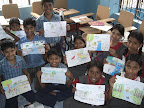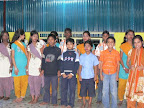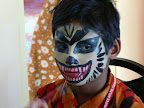I arrived at the Dhaka Project not really having any idea of what to expect, or even what I was going to be doing at the project. I had decided I was going to come at the whole experience with one particular goal in mind – to listen and learn. I wanted to know what the project wanted from me. They know their problems better than I do. I was just here to give a helping hand. I am a designer by trade…but also a native English speaker. So I became an English teacher, naturally!
So the challenge: How can we improve the English skills of 600 children?
Answer: By training 23 teachers to improve their English skills.
Next challenge: How do I learn how to teach English?
Answer: Lots of research, lots of study, lots of questions to fellow volunteers, and lots of feigned confidence!
First I had to evaluate the teachers. After seeing their results I created a syllabus which was appropriate. The biggest problems that we were facing were grammatical and pronunciation issues – most of the teachers were speaking what I began to refer to as ‘Banglish’ – including bad phrasing and incorrect pronunciation of words. Many also had thick accents. It was imperative that the children did not start to pick up on the errors, and that the accents were not being mistaken as another form of mispronunciation.
We had 17 lessons combined, with the focus on grammar. The content, whilst necessary, got boring at times, but we always had a laugh. Although I never thought that I would have to use so much discipline on adults. My next challenge was to try to stop laughing, and try to be mean! Stern looks and using “chup!” CHUP!
Despite a few small hiccups, the classes went well, and effort was shown by all, considering the busy schedule of the teachers. The teachers have very long days in difficult conditions. The school is currently understaffed, and many of the teachers are forced to cover the workload of missing teachers by taking classes for every period, giving them little preparation time. Given their background, the children (though gorgeous and completely hilarious) are a little on the ‘wild side’. I can see the exhaustion on the faces of the teachers as they come into my class after their long day. But nevertheless, we powered on, even having weekend workshops for 3 hours at a time for the final 3 weeks so we could cover everything before I had to depart.
Finally, the exam arrived and went ahead as planned. It was made up of 5 parts – listening, reading, basic grammar, writing and speaking. I had never written an exam before, so was a little nervous about the results. Would everybody fail? Would it be a fair reflection of everybody’s ability? I needn’t have worried, as the results were fair, and most people passed. There were actual improvements to be seen. Hooray! It was a success for the teachers, the Dhaka Project and I.
What I learnt whilst teaching English to the teachers:
• English
• Not nearly as much Bangla as I had hoped
• How to read a Dutch photocopy machine
• Don’t say you’ll visit a teacher’s house and then forget…
• The joys of Mama cha… Shingara!
• Don’t blame teachers for spelling errors when they are using the Oxford “Foreing Languge” (sic) Dictionary! (complete with spelling mistakes on the cover)
After all the work with the teachers, I was asked to take a quick look at the sewing section of the Dhaka Project to give some design tips and make it more sustainable. Unfortunately due to some visa issues, my trip here was dramatically cut short, and I was only able to dedicate about 15 days to it. (My blog with the final outcome of the “Sewing Challenge” will be coming soon.)
I will really miss this place – I have had so many crazy experiences. After a while I would wake up in the morning and forget that I was somewhere else. Gawair (the area where the project is located) just started to feel like home.
Most memorable moments in Gawair:
• The Qurbani, or sacrifice, on Eid Al Adha on my second day in Dhaka.
• Painting a picture with Julie to describe ‘diarrhoea’ on the handwashing awareness poster.
• Stepping in a pile of gutter ‘effluent’ when walking home in the dark
• Anything involving an obscenely loud microphone or megaphone outside my window at an ungodly hour
• Being head-butted by a cow
• Having cha with Farid the Freedom Fighter
• Children shouting Bideshi! (foreigner) at me everyday.
• Being welcomed into so many houses for delicious food with such warm hospitality.
Massive thanks to ALL staff at The Dhaka Project for the excellent experience especially Jewel (volunteer manager), Julie (my housemate), Irina (volunteer whose notes were invaluable to me whilst preparing the syllabus), my Mum (a teacher, sent me lots of links), and of course, to beautiful Bangladesh.
I will never forget my time here. I will back soon insha’allah.
Jessica






No comments:
Post a Comment